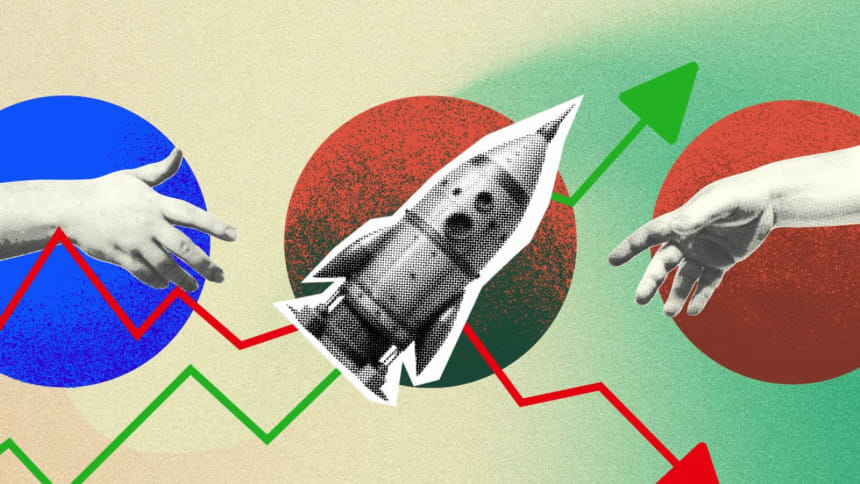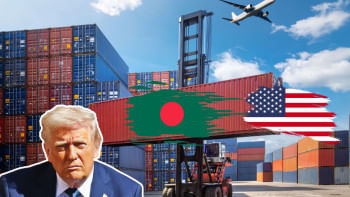Taking our start-up ecosystem to the next level

The role of start-ups in driving economic growth and societal change is undisputed in developed economies—Apple, Facebook, Tesla were all once start-ups. Start-ups are vehicles through which people come together to develop a scalable innovation. While the world is adopting self-driving cars and AI assistants, Bangladeshis seem sceptical about the prospects of these ventures.
This is starkly visible in investments in local start-ups, which reflect the level of support start-ups get from external sources. In 2023, Bangladeshi start-ups secured $73 million, with around 70 percent coming from foreigners, while India received over $11 billion. Per capita, Bangladesh invested 43 cents compared to India's $7.76—a 18-fold difference! Before analysing this gap, it's important to understand why start-ups need investment in the first place.
Our start-ups are applying new technologies to add efficiency to age-old processes. Successful ideas can have a GDP-level impact—from reducing fuel imports, fighting climate change to cutting food waste and improving healthcare. The start-ups working on education have made it easier for students in remote villages to access quality coaching through internet-enabled phones – essentially, upgrading the country's future human capital. By streamlining payments, bKash has accelerated the flow of commerce and added significant value to the life of every Bangladeshi.
These breakthroughs require dedication from some of our smartest citizens. We become proud when a Bangladeshi secures a $300,000/annum position at Google, but most people don't realise that local start-ups compete for the same talent. Google can offer such salaries because they expect the individuals to generate far more value in return. Although the cost of living in Dhaka is much lower than in California, the opportunity costs of staying back for our brightest minds are high.
Start-ups also need to collect data and run experiments to fine-tune their ideas, which require investment with no guaranteed success. Entrepreneurs must recruit talented individuals and take on the risk of building these systems, some of which can take a long time and many smart people. Like the Padma Bridge, start-ups deliver immense value only after they are completed and can be profitably scaled up.
The mechanism of start-up investments, successful globally, differs from investing in established businesses. Start-up ecosystems drive economic progress, but individual start-ups are high-risk, high-reward bets, unlike bonds or real estate. It is easier to gauge a building's progress than a start-up's technology. Venture capitalists specialise in evaluating these businesses and estimating their success probability, but the Bangladeshi VC sector is just getting started.
Bangladeshis entrust banks with nearly all the country's capital, and the banking sector prefers lending to traditional businesses, like rice mills, over investing in start-ups or VC funds. This terrible capital allocation strategy leads to excess rice milling capacity and many non-performing loans. The value of collateral depends on the country's economic prospects, which in the 21st century is driven by technology—the top-performing companies of the last decade have been tech firms. Our banking sector is living in the past.
In the past two years, the forex crisis and election uncertainty have severely impacted late-stage funding in Bangladesh. Top companies are starving for capital as their strategy depended on an evolving ecosystem. Since foreign VCs have shied away due to country concerns, so have local investors. The lack of late-stage activity will eventually hurt early-stage companies and restrain the ecosystem from flourishing.
If we truly commit to SMART Bangladesh and believe the start-up ecosystem can transform the economy, we need a coordinated effort from different actors. One impactful government initiative has been Startup Bangladesh, which has mobilised youth and driven local funding. However, we risk losing momentum if others don't act urgently.
"Exits" have been instrumental in galvanising local investments in other countries. For any investor, a key consideration is how they will eventually sell-out of their investment. For example, the sale of Skype to Microsoft in 2011, Estonia's first exit, created a chain reaction that led to one of the fastest-growing GDPs in history. Since then, Estonia, a country with less population than Mirpur, has produced a dozen unicorns and at least two decacorns—companies valued at over $10 billion each.
The lack of exits is holding back Bangladesh. Unlike in the valley, where successes like Uber or OpenAI created thousands of millionaires, the success of bKash has not yet unleashed the funding landscape here. We are left in a chicken-egg limbo where start-ups cannot scale due to lack of capital, and capital avoids the ecosystem because of lack of role models and exit opportunities.
Exits happen in two forms: (i) sale of the company or (ii) listing the company in a public stock exchange or IPO, both of which return money to early investors. In Bangladesh, the number of purchasers is limited for now, but our consumer-driven economy is bound to make Bangladeshi start-ups attractive acquisition targets for international giants. Nevertheless, sale of the company is suboptimal. Yahoo! had offered to buy Facebook in 2006 for $1 billion—had Mr. Zuckerberg accepted, he would not have created the $1.2 trillion in value for his shareholders. Creating that kind of value requires pursuing an IPO and a courageous, almost fanatical, commitment to the vision.
Bangladesh Bank was visionary in establishing a fund for start-up loans in 2021, but it has not had the desired impact since the banking sector did not pursue it aggressively. The central bank needs to create guidelines allowing banks to participate in the "upside" of start-up investments, achievable through the use of warrants, which are common in the global venture debt industry. To mobilise the banking sector effectively, powerful incentives such as reduced repo rates or lower forex purchase rates should be linked to start-up investment quotas. Bank shareholders need to incentivise professionals to seek out opportunities and adopt global best practices rapidly.
The number of investments by SEC-licensed VCs has also been negligible, and there is a talent gap among these investors. The prospects are improving as there are many early-stage start-ups now. The skill shortage should be addressed by attracting international talent and providing training to high-potential candidates. The VCs need to collaborate with international agencies, such as World bank, since a lot of impact funds are being mobilised for start-ups.
Regulatory bodies need to act as catalysts and move faster. If the target is to drive $1 billion in start-up investments per year, the government should contribute 20 percent. Beyond financial returns, there are greater societal benefits once this sector thrives.
The issue of IPOs must be addressed because without exits, it will be impossible to maintain motivation across the value chain. Bangladesh needs to send a clear message that we are self-sufficient for late-stage funding. India, Indonesia and China have been aggressive in creating new rules for start-up listings and it is time that we took a similar stance. Increasing the strength of the local funding environment will automatically attract more foreign investors.
Finally, the start-up ecosystem members need to collaborate vigorously. Founders should realise that macro and policy matters must align to unleash the ecosystem. Mentorship and policy advocacy have to become part of the Bangladeshi founder DNA.
The start-up ecosystem has developed almost organically so far. To reach the next level, it requires a coordinated master plan. Success hinges on collective act of courage from capital allocators, regulators, and founders to enact a uniquely transformative story that makes Bangladesh a beacon of technological and entrepreneurial success.
Waseem Alim is a co-founder of Chaldal.
Views expressed in this article are the author's own.
Follow The Daily Star Opinion on Facebook for the latest opinions, commentaries and analyses by experts and professionals. To contribute your article or letter to The Daily Star Opinion, see our guidelines for submission.

 For all latest news, follow The Daily Star's Google News channel.
For all latest news, follow The Daily Star's Google News channel. 








Comments